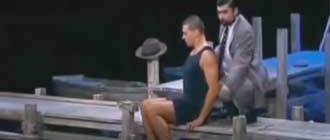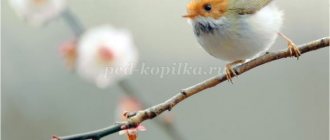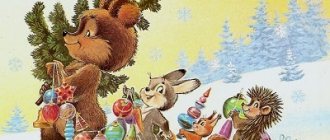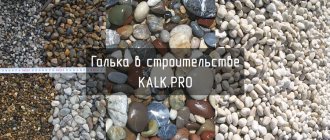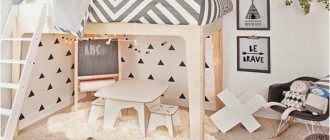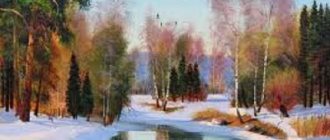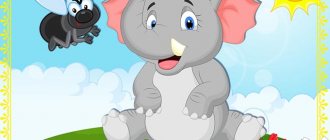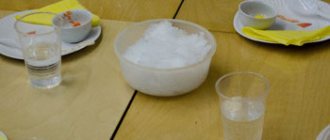Conversation “Hometown” methodological development (senior group) on the topic
Conversation “Hometown”
Goals: to expand and consolidate children’s knowledge about their hometown, to introduce children to the history of the city, to cultivate patriotic feelings for their small homeland.
Equipment and materials: illustrations, photographs of the native city in the old days and today.
Move
Educator. Guys, today we will talk about our hometown. Who knows what it's called? That's right, our city has a beautiful name Kropotkin. You and I, its residents, are called Kropotkinites. Let's repeat this word. Our city stands on the picturesque Kuban River.
The city of Kropotkin stands in the Kuban, dressed in lush greenery. Streets, squares, squares, fountains. Life is decorated with people.
People in the city love to work. They rush to work in the morning, and in kindergartens the voices of children ring louder than bells.
It was not for nothing that the main street of the city was named Red. On a holiday, it shines in scarlet color like the dawn.
New buildings are growing in the area. The city is becoming big. For us, Kropotkin is beloved, He will always be our family.
“These are the beautiful words the poet described our hometown!” Try to tell us why you love our Kropotkin. (Children's answers.)
— Guys, what kind of transport can you use to get to our city? (By train, train, bus.)
- Where does the train arrive? (To the train station.)
- Where does the bus arrive? (To the bus station.)
- What city transport do you know? (Children's answers.)
Educator. There are many different streets in our city. What streets of our city do you know? (Children's answers.) On what street is our kindergarten located? What important and interesting institutions and buildings are there in our city?
Children answer, and the teacher puts on a typesetting canvas photographs of buildings for various purposes (schools, kindergartens, libraries, clinics, post offices, banks, shopping centers, cinemas, etc.)
Educator. There are wonderful people in the world who have glorified their name with their work and talent. Cities, ships, streets, squares and boulevards are named after such people. In our city there are also streets and parks named after famous people.
Look at the portrait of this man. This is the first astronaut on Earth. His name is Yuri Gagarin. He flew around our planet on the Vostok ship. This ship was made in our city at the Progress plant.” One of the streets of our city bears the name of Gagarin.
And this is Sergey Vasilievich Tselykh. For the exemplary performance of combat missions of the command on the front of the fight against the Nazi invaders and the courage and heroism of the guard, Captain Tselykh Sergei Vasilyevich was posthumously awarded the title of Hero of the Soviet Union. A street in our city is named after the Hero. And in our city there are streets: Pushkin, Lermontov. Who are they named after? (poets). What is the name of the street where you live?
Guys, our city of Kropotkin is our small homeland, the most dear place on Earth. You and I are residents of our hometown. It depends on you and me what our city will be like in the future. If we love our city very much, make sure that it becomes better and better every day, then we will be able to say:
Is there somewhere on the planet,
What is hidden among the gardens and fields?!
There are big cities in the world,
But Kropotkin is my favorite of all!
Bottom line.
Educator. Kropotkin is getting prettier every day. We should all be proud that we live in such a big and beautiful city, don’t litter, plant flowers and trees.
Long-term plan for working with older children. Topic: "Getting to know your hometown"
Municipal budgetary preschool educational institution "Kindergarten No. 17"
Long-term plan for working with older children
Topic: “Getting to know your hometown”
Developer: Safronova T.A.
Teacher of the highest quarter categories
Lysva 2022
The teacher’s task when introducing children to the history of their native land is to show the complexity, inconsistency, and ambiguity of the historical path of their native land.
The richest materials on the history of our city collected by local historians, archaeologists and writers make it possible to glorify the socio-economic, political and cultural formation of the region
Each city has its own characteristics of historical development, specific features of culture and nature, which make up the phenomenon that forms in every person interest and attachment to his native land, his patriotic feelings.
Much has been written about the importance of introducing a child to the culture of his people, since turning to the national heritage fosters respect and pride for the land on which you live. Therefore, children need to know and study the culture of their ancestors. It is the emphasis on knowledge of the history of the people and their culture that will help in the future to treat the cultural traditions of other peoples with respect and interest.
Technological scheme of the experiment
We live in Lysva - a city of labor and military glory with its own history and long-standing traditions. Streets named after heroes, architectural monuments, sculptures - everything speaks about the past and present of our city. If we want our children to love their country, their city, we need to show them from an attractive side, especially since we have something to be proud of. In order for children to be interested, they need to present the material intelligibly, understandably, emotionally, starting with what surrounds them and gradually expand the circle of their knowledge.
At the beginning of the local history work, we conducted a diagnostic to identify children’s knowledge about their hometown. The results showed that most children do not know about the historical past of their city, its culture and attractions. To enrich the local history ideas of preschoolers, we set the following tasks:
— introduce children to the history and modernity of the city;
- to form in children an idea of various aspects of life in their hometown and its inhabitants;
— develop the desire to know your city;
- promote the development of a patriotic attitude towards the small homeland.
Work to familiarize older preschoolers with their hometown was carried out in the following areas: history of the city, city attractions, symbols and work of adults. The assigned tasks were realized through all types of activities: knowledge, communication, work and artistic creativity, play, work with parents. We developed a long-term plan that reveals the content of work for each type of activity, using a variety of forms of work: classes, conversations, reading fiction, compiling a story from pictures, thematic albums, excursions and walking walks, role-playing, board-printed and didactic games. The use of such a variety of activities helps to consolidate the acquired knowledge in children, has a beneficial effect on the education of patriotic and civic feelings, and makes it possible for children to feel their involvement in the history and modern life of the city.
Summary of the educational activity “We love our city very much”
Topic of the week: My city .
Age category: 6-7 years.
Form: quiz “What? Where? When?"
Date: March 2012.
Integration of educational areas:
Cognition, communication, socialization, reading fiction, artistic creativity.
Goal: To continue to form elementary ideas of pupils about their small Motherland - the city of Novokuibyshevsk.
Tasks:
Educational:
• Systematize the idea that for every person a small Motherland is the place where he was born and where he spent his childhood; • continue to introduce the sights of the city of Novokuibyshevsk; • continue to consolidate knowledge of your last and patronymic names; • improve the ability to create houses of different sizes and architecture by drawing from blanks (silhouettes of architectural buildings); independently select the color of paints to create an overall composition.
Educational:
• Develop creative, compositional abilities and imagination of students; • Develop verbal communication skills, develop the ability to read poetry expressively.
Educational:
• Foster patriotic feelings, love for the Motherland; • Continue to foster positive relationships between children.
Materials and equipment:
“Fairy tale ball” made of threads, a computer for displaying presentations from the “My City” series, whatman paper depicting a city landscape, paints, brushes for drawing, napkins, blanks for individual work (silhouettes of architectural buildings), an audio recording with the music of the song “Blue Car” , top with arrow; posters: “You won’t find better players than our experts!”, “Novokuibyshevsk is 60 years old”; badges – emblems for teams: “Experts” and “Erudites”; "rebus with letters"; prizes; "City Erudite" emblems, masks - hats of colors for the game, two envelopes, puzzles with pictures of the coat of arms of the city of Novokuibyshevsk, cards with riddles "Mystery Quiz", a soft builder for the game "Builders".
Preliminary work:
• Conversations: “Me and my family”, “My city”. • Examination of illustrations about the city of Novokuibyshevsk, maps of the city of Novokuibyshevsk, examination of state symbols (coats of arms) of the cities of the Samara region; • Reading and learning poems about the city, listening and learning songs about our city in recordings, • Drawings by children on the topic: “My city,” • Making attributes. • Individual work: Help children who have difficulty choosing blanks (silhouettes of architectural structures) and in the process of independent creative work.
Progress of the game: on a magnetic board there is a panel depicting an empty and dull city street, children's drawings of their favorite city, posters. Music plays, children come in and greet the guests.
The content of children's direct educational activities.
Educator: - Guys, I came to you today not alone, but with a little friend. - Try to guess who it is -
Tell me quickly, What kind of ball is made of soft threads? It looks like a bun, with a long tail... (ball)
(A ball rolls into the group. The teacher takes it in his hands and puts it to his ear...)
Educator: - Ball wants to say hello and get to know each of you. How to do this? (Children offer their own greeting options. At the suggestion of the teacher, the children decide to pass the ball around in a circle, saying the words of greeting and saying their first, last and patronymic names).
Educator: - Guys. Today we will play the game “What? Where? When?".
- To do this, you and I must split into two teams. And our magic ball will help us with this. He will ask you questions and you will answer. Whoever answers correctly will sit on a chair in one of the teams.
Educator:
- Guys, you all just said your last name, first name and patronymic. - Who gave you your first name, patronymic and last name? (Parents) - When did your parents give you your first, middle and last names? (When we were born)
(With the help of a ball, which the teacher passes from hand to hand to the children, the children answer the question, sit on chairs and receive emblems of the game participants of different colors)
Educator:
- Right. Every family, every person celebrates their family and personal holidays.
-Which of them is the most important? (Birthday)
— Not only a person can have a birthday.
Educator: - Who else might have a birthday? (Children's answers)
Educator: - Books, toys, houses, and even the whole city have their own day. Cities, like people, are given “names,” and citizens celebrate their birthdays.
Our city is celebrating its 60th anniversary.
Educator: - Guys, tell me what is the name of the place where a person was born and raised? (Russia, Motherland, small Motherland)
— What do the words Motherland and small Motherland mean? (The Motherland is the country in which we live, and the small Motherland is the place where a person was born and raised.)
— What is your small homeland? (city of Novokuibyshevsk)
—What are the names of the inhabitants of our city? (Novokuibyshevites).
— In what year did the construction of the city begin? (in 1947)
- Name the person who led the construction of our city and after whom one of the streets of our city is named? (Ivan Ignatievich Mironov) - What other streets do you know in our city? (Sverdlova, Voroshilova, Pirogova, etc.)
— Each city has its own coat of arms. What is depicted on the coat of arms of the city of Novokuibyshevsk? (three white lilies on a blue background)
Educator:
— Teams “Experts” and “Erudites” are ready to play. Let's choose team captains with a counting rhyme:
- One, two three, four, five We are going to play. A magpie flew to us and told us to lead us. (Children of each team choose team captains using a counting rhyme)
Educator:
— The spectators will sum up the results of our game.
— Dear players, let me introduce you to your opponent - this is a magical ball that will ask you questions. (Children of each team spin the top)
Glomerulus:
— Attention, dear players. The first competition "Warm-up".
— Now a player from each team needs to read a poem about his hometown loudly and expressively.
Team "Experts".
1 child:
In the Russian outback, far from the capitals, the streets spread out like the wings of birds. The workers' settlement has acquired a new look - And now a new city stands on the Volga.
2nd child:
My favorite city! Bloom and grow! I can’t find anywhere more dear than you! I praise you, my Novokuybyshevsk! And wherever I am, you are next to me!
Team "Erudites".
1 child.
There is a small but nice city. Over the Volga, the Russian river. Years go by, but he is still young, Our Novokuibyshevsk is native.
2nd child.
Every resident loves their city, the people are good and hardworking. An oil worker, a chemist and a builder live here as a friendly family.
Ball: - Well done! Both teams coped with the first competition.
(Children spin the top)
Ball: - Let's start the game. Second competition "Answer the question."
Question for the "Experts" team.
1. Why does the city have such a name - Novokuibyshevsk? (Because our city was built on the site of the village of Lipyagi, next to the city of Kuibyshev (now Samara)
- Well done! This is the correct answer.
Ball: — Question for the Erudite team.
2. Near which great Russian river is the city of Novokuibyshevsk? (Novokuibyshevsk is located near the Volga River - the great Russian river)
- Well done! This is the correct answer.
Ball: - Third competition “Who is attentive.” (Display of a presentation about the city based on the game “Fourth Wheel”)
Ball: — Question to the “Experts” team.
1. What street is not in Novokuibyshevsk? Sverdlov streets, Tsvetochnaya streets, Gorky streets, Dzerzhinsky streets? (children choose the correct answer: there is no Tsvetochnaya street in Novokuibyshevsk)
- Well done! This is the correct answer.
Ball: — Question for the Erudite team.
2. What attraction is not in the city of N-kuibyshevsk? Park "Dubki", square named after. Lenin, Eternal Flame, Opera House? (There is no opera house in the city)
- Well done! This is the correct answer. Both teams gave correct answers to these questions.
4. Game “We are builders” (Children, on a signal, build a building from a construction set)
Ball: - And now it’s time to play quickly. Now you and I will work as builders. Each team will build their own building using a construction set.
The goal is to make it as quickly and reliably as possible. So, let's get down to the task.
- Well done, both teams completed the task.
5. Showing a presentation based on the type of game “The Fourth Wheel”.
Ball: — Question to the “Experts” team.
1. What professions are there in our city? - Teacher, builder, farmer, driver. (In our city there are professions: teacher, builder, driver)
— Question for the Erudite team.
2. On what street is our kindergarten located?
On Voroshilov Street, st. Stroiteley, st. Etc. Pobedy, st. Karbysheva. (Our kindergarten is located on Karbysheva Street)
- Well done. Both teams coped with these tasks.
6. A set of general developmental exercises “Profession”
“Now let’s all rest together and perform the movements in accordance with the text.”
I, the driver, washed the car, (stomping step) I sat behind the wheel and arched my back. The engine hummed and the tires rustled around the car. The janitor sweeps the yard, the janitor removes the rubbish. (bends forward with simultaneous jerks of the arms, simulating sweeping) Our guard at the post boldly looks into the darkness. (turns right and left, putting your palm to your eyes) And the shoemaker will sew boots for anyone. (hands on the belt, sit down, stand up, alternately placing one foot on the heel) He will sew horseshoes to the boots and dance without stopping. Our pilots - pilots (tilt the body to the right and left, straight arms to the sides) Prepared for the flight. I'm a gymnast. My dexterity delights everyone around me. (various types of jumps) You see how deftly I perform a difficult trick on the uneven bars. Look around you more cheerfully: (calm inhalation through the nose and long exhalation) The children's doctor is a friend to the children.
- Well done. We had a good rest. Let's continue the game.
7. The next competition “Make a word” (for attention) (Teams are given a task - to compose and solve the word as quickly as possible)
Assignment to the “Experts” team.
1. You need to compose and read the confusing words in which the names of cities in the Samara region are hidden.
Words:
RA – MA – SA EVSK – PA – CHA RAN – SYZ TI – YAT – TOL
Assignment to the Erudite team.
2. You need to compose and read the confusing words in which the names of the rivers of the Samara region are hidden.
Words:
GA – WOLF KA – MAR – SA KA – EV – PA – CHA KA – YAN – TAT
- Well done. The teams completed their tasks.
8. "Musical break." (Children sing the song “Curious Citizen” to the melody of the song “Blue Car”)
1. If for some reason I’m not in the mood, If I feel sad again. I take my friends with me and a handful of sweets, and go for a walk around the city.
Chorus: In the city, in the city Life is always in full swing, There is no time for our city to be bored. Great, great, I don’t care about the melancholy, I want to know everything about the city.
2. Why was the street called Ozernaya? And why Pobeda Avenue? The whys are pouring out of me like a river, Maybe I can figure out what’s what?
Chorus.
3. How many areas do we have? And how many schools? And what kind of museum opened here? I haven’t found the answers to everything yet, but I want to find them as soon as possible.
Ball: - Well done. You sang a song about your city very well.
9. “Mystery Quiz.”
— Dear players, you have the lucky “Mystery Quiz” sector.
You have the opportunity to ask questions - riddles to each other. (A child comes out from each team, takes a piece of paper with a question - a riddle and reads the riddle to the other team)
- So, the task for the “Experts” team.
Mystery quiz.
1 . Guess, guys, there are riddles about the city. I’ll start reading poetry, you’ll have to continue. Trains are noisy everywhere, and people are going everywhere. From all sides, from all ends, Who are waiting for the trains to arrive. We invite him to the hall, What is called... (station)
2. It contains amazing paintings, rare and delightful paintings. But they won't be allowed to buy them. Not because they cost a lot. After all, this is the treasure of my country, Not a store here, but... (museum)
3. Here you can drop a letter, Send a telegram. Call your mom on the phone while on a business trip. You can buy an envelope here Send a parcel urgently. Say hello to everyone. After all, this building is... (mail)
4 . People in white do not get bored, do not sit idle, courses of treatment are prescribed by these people in white. If someone gets sick, everyone goes for treatment to the city, regional, children's... (hospital)
5. What kind of wonderful house is this? There are a hundred children in that house. The house is very happy for the children. What is this?... (kindergarten)
6. If the refrigerator is empty, If there is nothing to eat, There is no bread, no cabbage, No butter or buckwheat. You come here quickly And take a basket, Buy what’s tastier In our... (store)
- Well done. All the riddles were solved.
10. “Collect a picture.”
Ball: - The next task is “Who can complete the puzzles faster” with the symbol of the city of Novokuybyshevsk. Each team is given a task in an envelope - to collect a picture with the symbol of the city and guess what is depicted on it. (A “whole” picture with the city’s coat of arms appears on the computer screen, the children compare it with their picture).
— Well done, both teams successfully completed the task.
11. Low mobility game “Plant flowers in the flowerbed.”
Goal: To consolidate knowledge of colors, the ability to navigate in space, move to music, and follow the rules of the game. (Children wear masks - hats of flowers, large flowers of red, blue and yellow are laid out on the floor. Music plays, children - flowers walk. When the music stops playing, the children take their places on the “flowerbed” in accordance with the color.)
Ball: - Well done, you planted beautiful flowers in your flower beds.
Summing up the game “What? Where? When?"
Ball: - Guys, you are great! You answered my questions very well today. I see you know and love your city in which you live. I congratulate both teams on their victory and present all players with Urban Erudite badges (Children wear Urban Erudite emblems).
12. Artistic creativity of children.
Creation of the general composition “My City”.
Ball: - The city has an anniversary, a birthday - 60 years, and on such days it is customary to give gifts. I put these paper silhouettes of buildings, flowers, trees, brushes, paints in my magic chest.
“And you and I also have a large sheet of paper that depicts a completely empty and dull city street. And the most important thing is that each of you is a little artist and dreamer.
And now you will create a collective composition, decorate our city with buildings, trees and flowers. (Music sounds, children complete the task)
Educator: - Our gift is ready. Each of you contributed a piece of your love to your hometown. What will we call our work?
Children come up with a name and display the collage in the kindergarten group.
Shcherbakova Irina Aleksandrovna, teacher of the kindergarten “Karablik” kindergarten, State Budgetary Educational Institution of Secondary School No. 19, Novokuibyshevsk, Samara Region
- Summary of a lesson on teaching older preschoolers literacy “Journey to the city of Zvukograd”
- Scenario for speech therapy leisure “Journey to the City of Beautiful Speech”
- Summary of a speech therapy speech festival for primary school students of type VIII [We love our native language and study it]
- Lesson summary on the topic Transport + Presentation
- Summary of an open speech therapy lesson in the senior group “The Magic Letter M”
( 5 liked, average score: 4.80 out of 5)
Loading...
